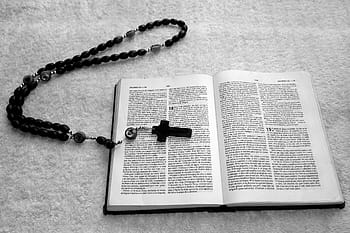Now as they went on their way, Jesus entered a village; and a woman named Martha received Him into her house. And she had a sister called Mary, who sat at the Lord’s feet and listened to His teaching. But Martha was distracted with much serving; and she went to Him and said, “Lord, do you not care that my sister has left me to serve alone? Tell her then to help me.” But the Lord answered her, “Martha, Martha, you are anxious and troubled about many things; one thing is needful. Mary has chosen the good portion, which shall not be taken away from her.” Luke 10:38-42
Many of us are familiar with the story of Mary and Martha. They were good friends of Jesus, together with their brother Lazarus, who Jesus would later raise from the dead. There are many interpretations of this Gospel story. The most obvious is the tension of time management. Many people are quick to rush to Martha’s defense because work is a necessary part of life. Who has time to sit with Jesus all day when there is work to be done? Many criticize Jesus for His telling Mary that she is right in focusing on the one needful thing. After all, aren’t work, raising children, family responsibilities, and even household chores “needful” things? Here is another way to look at the story:
Martha had a tangible output for her efforts. She was running around, cooking dinner, setting the table, showing hospitality, being a good host. There was a tangible outcome for her efforts. Mary, on the other hand, was listening to the words of the Lord. She was not accomplishing anything tangible. Let’s say that after an hour, Martha had put out a meal that her guests could see and taste. Mary, on the other hand, perhaps had a softer heart, a cleaner spirit, was wiser in the ways of the Lord. All of these are good things, but they are not tangible.
When we become obsessed with the tangible, we forget the “needful thing” that Christ mentioned, the genuine relationship with Him. And when the tangible doesn’t work out—and let’s be honest, there are many times it doesn’t work out—because we’ve burned the dinner, or been in a car accident, or despite our efforts to be successful parents, our child behaves poorly at school or fails a test, then we break down because we have failed at both the tangible things and the intangible ones as well. This leaves us feeling fragile and struggling with identity. Because there is a palpable tension between being the Mary that Christ calls us to be and the Martha that the world calls us to be.
There is no question that we play both the role of Mary and Martha. I’ve even heard people use the phrase, “trying to be Mary in a Martha world.” There is no escaping that the Martha elements are always present. There is always a child who needs us, or a job that demands our time, or a person we are trying to impress, or a project we’ve put off.
However, what do you think pleases Christ? The stressed out running around of Martha, or the inner peace of Mary? No matter what, there are going to be Martha elements in our lives. Being “Martha” is part of our identity, whether we are a mother or a father or a worker. We tend to tie our sense of self to what makes us successful, instead of tying our identity to Christ. This makes us feel fragile and broken down when whatever we identify ourselves with goes badly. We tend to feel things like, for example, “my house is a mess, therefore I am a mess” or “my kids are difficult, so I am a bad parent and therefore bad.” And again, what is more important, gathering the finest furniture you can find and taking it, even if it means you stole it? Or it is better to live within your means, content with the purchasing of your own equipment, and paying for it via honest means? The world may reward the things that Martha can purchase, but it is the way Mary chooses to live her life that pleases God.
We tend to forget that the “needful thing” is an authentic relationship with Christ. From this relationship, all other things in life slot the right way. When we are solid “Mary’s”, in terms of making our relationship with Christ the number one priority, then we keep the “Martha” stresses in check and in the proper balance. Remember what Christ told Martha—it’s not the running around that is needful. Maybe it is expected by the world, or some standard we’ve created for ourselves and our peer group. Christ told Mary that one thing was needful, and that was a relationship with Him.
So, in the midst of living in a Martha world, don’t forget that it is more important to have the needful thing of Mary. And just so we can recount the story correctly, Martha actually more than redeemed herself. In John 11, it was Martha who said, in the presence of Jewish leadership hostile to Jesus, “Yes, Lord, I believe that You are the Christ, the Son of God, He who is coming into the world.” (John 11:27) This is a high “confession” of Christ as the Son of God. Indeed Martha had the “needful thing” as well.
In this unit about “being at peace,” we will find the greatest peace in Christ. No matter how busy life gets, when we make time for the “needful thing”, Christ, we will also find His peace, which as St. Paul writes in Philippians 4:7 is “the peace of God, which passes all understanding.” This peace, which is peace in the midst of conflict, provides encouragement to us in the midst of our life stresses. And it comes through cultivating a relationship with Christ on a daily basis.
Lord, thank You for Your many blessings. Thank You for walking with me in my challenges. Please help me to know what the “needful thing” is. Show me the path to righteousness and give me the courage to walk it. In times of material setback, help me to focus on the spiritual victory. Help quiet the voices that seek to drag me into materialism and consumerism, and fill my heart with love for You, that I may not only be “successful” in my career and my home, but that I may be successful in my heart, that it may always know You. Amen.
Focus on being a “Mary” this week instead of a “Martha.”
The Revised Standard Version of the Bible is copyrighted 1946, 1952, 1971, and 1973 by the Division of Christian Education of the National Council of the Churches of Christ in the U.S.A. and used by permission. From the Online Chapel of the Greek Orthodox Archdiocese of America.




